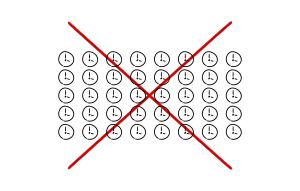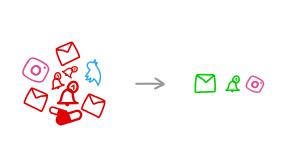Once an addict, always an addict?

Is an addictive personality a thing?
Is an addict’s brain permanently broken?
Can you recover from addiction or does it last a lifetime?
You’ve probably heard Once an addict, always an addict (OAAA) before. I had to explore whether it’s true because the implications of it are rather serious.
If you think this view is correct, it means::
- It means that you can’t fully recover from your addiction
- Addiction is chronic and will always come back if you don’t try hard enough
This leads to a lot of misconceptions that can be harmful. For example, if people believe they can’t ever recover, they don’t even try because what would be the point? So I dove deep into the topic and looked at what science says about it.
Luckily, the OAAA view is based on 1930s AA thoughts when addiction was thought to be a moral failure and neuroscience didn’t really exist.
Also, Once an addict, always an addict can be really unhelpful in today’s behavioral addictions centered around the internet, social media, and technology because you can’t really quit them all.
Why?
Read on.
If you want to have a better picture about what exactly addiction is, read the first part in the addiction series.
And now let’s dive into the topic proper.
There are 2 main ways of thinking about recovering from addictions.
Opinion A:
Addiction is a chronic disease that will keep returning to your life. Recovery is temporary (also called remission) and doesn’t mean you’re cured forever. This supports the once an addict, always an addict concept.
Opinion B:
Addiction is a learned way of coping with negative emotions that changes your brain rapidly. You can unlearn it, your brain will change once again via neuroplasticity.
Arguments for A
- Certain changes in the brain are long lasting and this might make you more susceptible to addictions. This probably depends on the severity, the length, and type of the addiction. Addictions can alter your brain so it won’t be functioning like it used to.
- Your life has factors that make you prone to addiction - addictive personality (more on this below), you experienced childhood trauma, you might be prone to depression, or anxiety.
Arguments for B
- People who successfully recover from addiction live a better life. So calling it disease doesn’t help. When you recover from an addiction, you don’t go back to zero. Instead, you live a better life. You don’t return back to baseline so we shouldn’t call it recovery. [1]
- People overcome addiction without any formal treatment all the time and sometimes it is out of nowhere. [2]
- People who recover from addiction are less likely to take on another addiction. [3]
If you compare the two, it’s an interesting development.
Opinion A (addiction = chronic disease) is based on the strongest version of the brain disease model of addiction.
A similar outlook is also supported by Alcoholics Anonymous. The first step in their recovery program is to admit that you have no control over your addiction: We admitted we were powerless over alcohol - that our lives had become unmanageable - AA, the 1st of 12 steps.
This can be viable for substance use disorder or things you don’t have to engage with ever again. It’s a simple rule that people follow and people in AA build up streaks.
AA thinking makes sense and has been practiced for almost a century, but that doesn’t make it true. It’s based on 1930’s assumptions.
Opinion A can make people feel powerless. I’m an addict and I’ll be that way forever - it creates feelings of shame and being a victim. It also creates a stigma in society that addicts are somewhat broken and can’t be fixed.
Opinion A seems a little bit outdated. Abstinence isn’t necessarily the goal.
We think it’s not the best approach.
On the other hand, opinion B (addiction = a learned way of coping) provides a more helpful outlook on the topic. If your brain changes, you stop being addicted. If enough time passes, you can start engaging in the behavior in a healthy way once again.
This is the path to freedom and mastery. You’re not a slave of your addiction, you don’t have to be scared of it anymore.
This has some merit, for example, when it comes to alcohol - you can go from being addicted to alcohol, to having a social drink once a week.
Then there are things where there is no other way. You probably can’t realistically abstain from the Internet.
Opinion A would mean that if you’re addicted to the internet, you should abstain forever because it’s only time before you relapse and start using it compulsively again.
To resolve how much you can really recover from addiction, we need to resolve another question first.
Is there an addictive personality?
There is a general notion that there is such a thing as an addictive personality.
Once again, even if something makes sense, it doesn’t make it true.
There is limited support for the concept of addictive personality in scientific studies. Certain people are more anxious, and worse at dealing with stress. They can have a certain genetic makeup that makes them more prone to anxiety. These people might be more susceptible to addictions. But that doesn’t mean they have an addictive personality.
Thinking that you have an addictive personality is unhelpful. It’s something you can’t change and it rather victimizes the addict and can be used as an excuse to not do anything about their current state.
People often claim to have an addictive personality. Especially, when they seem to be trading one addiction for another. But what if they don’t have an addictive personality? What if they become addicted all the time because they don’t resolve the underlying cause (running away from negative emotions, stress, or discomfort) of their addictions? What if they never learned to tolerate those negatives and so they have to constantly numb themselves.
Another argument people use is that addictions run in their family. In reality, there are probably more factors involved.
Yes, the family might be more susceptible to stress and anxiety through genes.
Or maybe, if the family has to deal with an addict, it can cause a lot of stress or even trauma to the family which can cause another person to become addicted as an escape from this.
It might also be the case that the whole family is ill-equipped to deal with stress and anxiety… If parents don’t know how to deal with emotions, their kid usually doesn’t learn it as well.
This isn’t to blame anyone because no wonder people are ill-equipped to deal with their emotions. After all, it’s been only a decade or two since it became somewhat socially acceptable for a man to actually have feelings and experience emotions. Before, you were told to man up and just deal with it.
Addictive personality is only weakly supported by science and it can be unhelpful in overcoming addictions because it’s something you can’t change.
So can you recover from an addiction?
You most certainly can.
People do it all the time without any formal treatment. That doesn’t mean it’s easy. Depending on how much the brain is altered by the addiction, it can be super difficult.
Also, most studies have been done on substances (drugs, alcohol, cigarettes). You can view behavioral addictions like the lite versions of substance addictions, so the recovery might be quicker.
Q: Is my brain ever going to be functioning normally? Or is it permanently broken?
A: Your brain is adaptive and neuroplasticity will take place.
In certain cases, the brain won’t ever be the same, but it can become functional again. It depends on the length of the addiction and the type of addiction (chemical addictions being worse). But most people recover.
I think, there is an even more interesting question
Q: Can I ever come back to the behavior?
A: The neural pathways will be there for a long time, so you have to remember that you’re more susceptible. What wires together, fires together.
However, that doesn’t mean you need to avoid the behavior forever.
There are people who went through AA, recovered from their alcohol addiction, and are able to drink moderately.
The likelihood of coming safely back to the behavior depends on whether:
- You resolve the underlying causes that drove you to addiction in the first place
- Learn to handle your emotions better
- Your life generally improved
What about other addictive things?
If people successfully overcome one addiction, they might be less susceptible to others. [3]
Because they have already developed a toolbox to deal with emotional adversity. Also, people also know how much it sucks to be addicted so they are wary of another addiction.
This doesn’t mean you should go and try coke because you overcame a different addiction. No, this is to break the habit of thinking that you have an addictive personality.
We’ve already explained that an addictive personality is more of a construct.
On one hand, thinking that you have an addictive personality can be helpful because you’re scared of addiction and you will abstain on purpose from other things.
On the other hand, it also can make you feel like you’re powerless and can make you more susceptible to getting addicted. Especially if you give in and start engaging in addictive behavior, you might feel you aren’t in control.
It’s better to not use the addictive personality concept because you can’t change it and focus on areas you can improve: becoming more mindful of your behavior, learning how to deal with your emotions, and improving your life in general.
If you do this, you will increase the probability that you won’t get addicted again.
Summary
Once an addict, always an addict is a catchy phrase that isn’t based on real science.
You can recover from addiction and even moderate the behavior later on in life.
Your brain can start functioning normally again in a span of a few months. It doesn’t have to be the same, but it should work just fine.
If you successfully overcome an addiction, resolve the underlying issues, you might even be less prone to future addiction.
The next question is then, how to recover from addiction?
Sources:
[1] https://onlinelibrary.wiley.com/doi/abs/10.1111/j.1465-3362.2010.00190.x
[2] https://ndsn.org/summer96/alcohol.html
[3] https://jamanetwork.com/journals/jamapsychiatry/fullarticle/1901525



